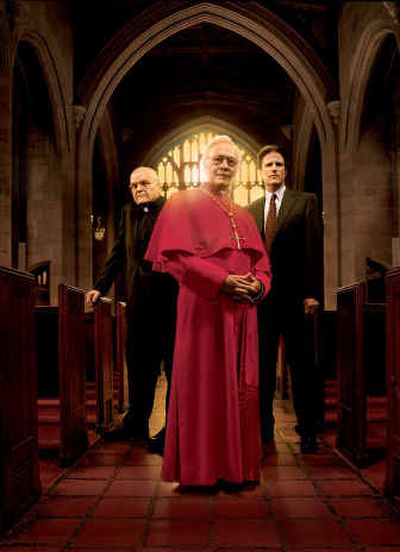‘Our Fathers’ explores sex scandal in Boston Diocese

When it’s time for the kindly visiting parish priest to go up and bless the kids goodnight, the worried boys at the top of the stairs grimace and shudder. They know what’s coming.
The uncomfortable scene depicting a young Father John J. Geoghan making a house call in Hingham, Mass., in 1967 opens “Our Fathers,” the powerful and courageous new Showtime film exploring the sex-abuse scandal in the Boston Diocese over the past half-century.
Written by David France – and based on his best-selling investigative book, “Our Fathers: The Secret Life of the Catholic Church in an Age of Scandal” – it arrives Saturday just a few weeks after television devoted hundreds of hours to the inner workings of the Roman Catholic Church.
Precious little time during last month’s exhaustive coverage of the death of Pope John Paul II and the naming of his successor mentioned this dark chapter of the Catholic Church, though.
“Our Fathers” – a strongly acted film starring Ted Danson, Brian Dennehy and Christopher Plummer (as Cardinal Bernard Law) – brings back the scandal that unfolded over three years, implicating thousands of priests across the United States and the cover-up of the abuse that led to some of the church’s highest offices.
Already the two stories have collided: A screening of “Our Fathers” in Boston was canceled in deference to the pope’s death.
And director Dan Curtis ended up shooting it entirely in Toronto, and not because it was cheaper to do there.
“We couldn’t film in Boston,” says France, who completed the screenplay before he finished his 650-page book. “We tried to get permits to film in Boston. We couldn’t.”
It was part of a general stonewalling from Boston – and the archdiocese – about the issue in general.
There is some irony that Danson, who came to fame from another TV production set in Boston – specifically a bar “where everyone knows your name” – plays the lawyer representing the victims, Mitchell Garabedian.
“I didn’t have a huge desire to play Mitchell Garabedian,” Danson told a press session earlier this year. However, he added, “I had a huge desire to be part of this piece” because of its social importance.
In particular, he said, he was impressed by the victims, who lent their stories and names to the project.
“Instead of being victims or just buried in the anger, they’ve gone out and tried to find ways to bring healing to both the people who were victimized by the church and healing to the church itself,” Danson said.
For those whose stories were told, it was odd to see them played up on the screen. But one victim, Olan Horne (portrayed by Chris Bauer), says he was touched by seeing the youthful version of himself in peril.
“All of what you need to know about these issues are in this film,” he said.
None of the abuse is explicitly shown, other than a priestly hand on a knee or close-ups of tearful children. But the actors who play the victims as grown-ups – including Bauer, who was dockworker Frank Sobotka in the second season of HBO’s “The Wire” – occasionally explode into detail of what they had to endure.
Plummer, in portraying Law, bears little physical resemblance to the portly cardinal. But he has one of the more complex performances, eking out a bit of sympathy as a man who didn’t want to see the church harmed.
Turning in a brief, powerful performance is Ellen Burstyn as the mother of seven boys abused by Geoghan.
To balance the impression that all priests were predatory, Dennehy plays a fiery parish priest from Lowell, Mass., who decries the scandal from the pulpit and who in private speaks like a member of “The Sopranos” (all dialogue is from firsthand reporting, France says).
Dennehy says his performance was fired by personal outrage.
“I live in a small town in Connecticut, and there’s a family there whose name I will not mention for whom this series of incidents was a source of particular grief,” he said. “The boy grew up to be a man who killed himself when he was 40. Never recovered.
“The thing about this crime is that it’s the crime that keeps on giving. It’s not just the kids. It’s their families, their brothers and sisters, their uncle, their aunts, their wives or husbands, their children. Generation after generation, person after person. It’s a terrible, terrible, devastating crime.
“And for a church – any church – or hierarchy, any hierarchy, to participate in the cover-up, in the concealment of this crime so that the crime continues to be committed, is unspeakable.”
The film ends by noting that Law, who was forced to resign his post as archbishop in Boston, ended up with a more prominent position – in Rome.
But “Our Fathers” was completed before he emerged in a more visible role, running the pope’s funeral.
And while there are scenes that involve Pope John Paul II discussing the issue, there is nothing from German Cardinal Joseph Ratzinger – although when the future Pope Benedict XVI was asked about the scandal at the time, he dismissed it as mostly media hype, saying: “I am personally convinced that the constant presence in the press of the sins of Catholic priests, especially in the U.S., is a planned campaign.”